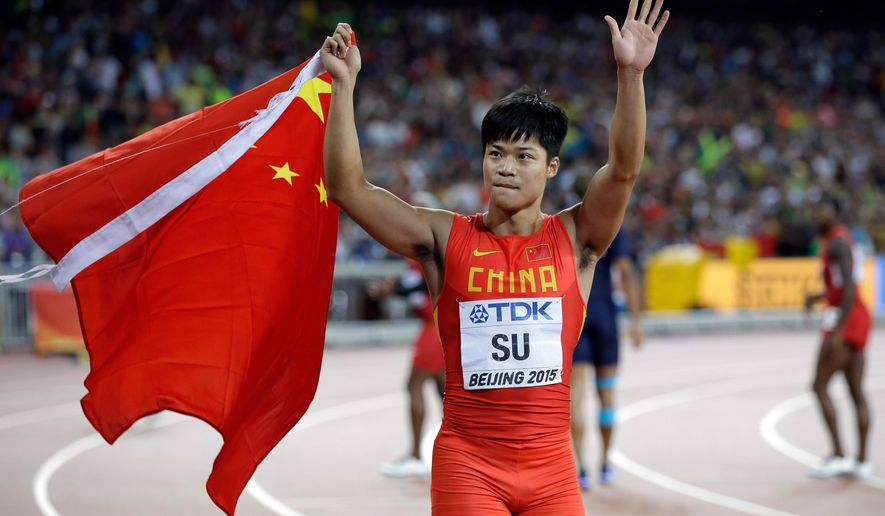As China gears up for a communist-style extravaganza with a military parade and ceremonial grandiosity next week to commemorate the 70th anniversary of the defeat of Japan in World War II, Beijing is determined and eager to show off its military might to the world. It’s also making a clear attempt to isolate Japan from the international community and send a special message of China’s military might to its most distinguished guest, Russia’s equally bombast-loving President Vladimir Putin.
The campaign is not going well.
Japan has not been isolated, as not a single head of state from Western democracies, except the Czech Republic, accepted the invitation to be at the Sept. 3 parade. And it remains to be seen if Mr. Putin, who is obsessed by military bravado, will be shocked and awed by the hardware on display when he comes to Beijing.
That’s because China and Russia have been entangled in a subtle-but-fierce — and not always so brotherly — competition when it comes to ceremonial pomposity, military superiority and martial masculinity.
The parade comes less than three weeks after a humiliating rout of the Chinese by the Russians in the world’s largest military games, hosted by the Russian Ministry of Defense in the Alabino proving ground outside of Moscow.
While most Americans were intoxicated with Donald Trump’s campaign and Tom Brady’s Deflategate, tens of millions of Chinese military enthusiasts and the PLA high command were consumed by the Moscow competition, officially known as the International Military Games. State-owned China Central TV tracked every one of the 14 events of the games closely; PLA soldiers and China’s multitude of military buffs were glued to their TV sets to watch broadcasts of the games. China’s military commentators had a blast breaking down every possible angle of the competition.
In the end, however, the Russians beat the Chinese soundly in virtually every one of the 12 categories China participated in, including Tank Biathlon, AviaDarts, the Caspian Cup and the Suvorov Onslaught. Russian’s military commentators expressed blunt criticism of China’s performance, and the criticism was promptly picked up by Chinese press and the Internet.
Officially, however, China cried foul and accused the Russians of cheating. Gen. Liu Ying, head of the Chinese military team, and numerous military commentators complained that the Russian hosts kept changing the rules of the games to deliberately disadvantage the Chinese team. The Russians said China’s complaints were nonsense and were designed to cover up the Chinese team’s inadequacy and shortcomings.
In particular, Russia countered that the Chinese fell short because they endeavored to be different from the other entrants. Of all the teams from the 17 participating nations — including Russia, China, Angola, Armenia, Venezuela, India, Kazakhstan, Kyrgyzstan, Kuwait, Mongolia, Nicaragua, Serbia and Tajikistan — China was the only nation that refused to use the weapons and equipment issued to every team, Russian analysts noted. Instead the Chinese insisted on hauling in their own tanks, armored vehicles, guns and ammunition. It was obviously a sign of Chinese distrust for the Russians. As a result, according to the Russians, there were always many adjustments of rules to make sure China’s own weapons, which were usually newer and heavier, would be comparable to the Russian-provided standardized weapons that all other participants were using.
China countered by accusing the Russians of “ulterior motives” in forcing everyone to use Russian weapons, especially Russia’s main battle tanks, the T-72B3M and T-72B3, in order to promote sales on the world arms market. Yet China clearly wanted to sell its own tanks to the global market too, which is why China brought its own Type 96A tanks. The tanks are more technically advanced and powered by a much larger engine.
This year’s loss was all the more painful for the Chinese because last year’s humiliation at the similar event seems to have continued, pointing to a pattern of poor performance by the Type 96A tanks. The Chinese tank became a butt of jokes at the Russian-hosted 2014 Tank Biathlon after its caterpillar track fell off while passing the VIP reviewing stand in the final rush to the finish line, losing the competition not only to Russia but also to Armenia.
The infamy of that defeat deeply wounded the Chinese national ego and military pride, and the blame was put squarely on Russian dirty tricks.
“To sell a few more of its tanks for a few stinking rubles,” fumed one prominent Chinese military commentator, “Russia is playing hardball with us, which shows some Russian military leaders are truly small-minded.”
Next week, it will be China’s turn to show the small-minded Russians some Chinese big-mindedness.
• Miles Yu’s column appears Fridays. He can be reached at mmilesyu@gmail.com and @Yu_miles.
• Miles Yu can be reached at yu123@washingtontimes.com.




Please read our comment policy before commenting.